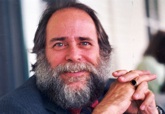

Marc Bregman and Christa Lancaster are co-directors of The Center for Archetypal Dreamwork.
Marc Bregman founded Archetypal Dreamwork in 1973 and is the Co-Founder and Co-Director of North of Eden and The Center for Archetypal Dreamwork. Marc is a master Archetypal Dreamwork Therapist, in practice since 1973, a teacher and a trainer of teachers. He is the author of The Deep Well Tapes, The Secret of the Pomegranate, Sex, Trauma and Conjunctio and Hubris of the Heavens: Archetypal Dreamwork and Rudyharian Astrology and is currently working on two books – The Practitioner’s Guide to Archetypal Dreamwork and Gravity: A Biography with Susan Marie Scavo. Marc has a Bachelor’s Degree in Religion from the University of Vermont and a Master’s Degree in Special Education from Johnson State College. Marc worked for the United States Postal Service and as a social work for the State of Vermont before becoming a full-time therapist. Marc was born in Philadelphia, spent three years in the Army and traveled for several years before settling in Vermont.
Christa Lancaster is the Co-Founder and Co-Director of North of Eden and The Center for Archetypal Dreamwork. Christa is a master therapist, in practice since 1991, a teacher and trainer of teachers. She is the co-author with Marc Bregman of The Deep Well Tapes: Sex, Trauma and Conjunctio – it includes her spiritual memoir of her journey through this work called Vessel. Christa has led groups and events for Archetypal Dreamwork since 1992 before Co-Founding North of Eden. She completed the certificate program at The New England Art Therapy Institute and spent five years studying with Pathwork Vermont. She attended Brown University and has a Bachelor’s Degree in Art History from Barnard College. Her years of experience working with groups underlie the NOE Retreat process. Christa was born in Bermuda and spent her teenage years in England before moving to New York City in 1976 and settling in Vermont in 1987.
Discover these discount codes for you!: GoDaddy, Budget.com car rentals, and Avis coupons.
A psychology podcast by David Van Nuys, Ph.D.
Podcast: Play in new window | Download
Subscribe: Apple Podcasts | RSS
Thank you, Dr. Dave, for producing your regular podcast. I have been listening to your programs for the past year, and though I rarely agree with your guests, I find your interviewing to be respectful and courteous. Your observations and questions are often more stimulating than the responses elicited from your guests.
That said, and with all due respect to Marc Bregman and Christa Lancaster, I found their comments to be devoid of substance and specificity.
I’ll start with a contradiction. Mr. Bregman criticized Jung for not having had a direct “experience of the divine,” asserting the importance of the personal “emotions/ feelings” attached to the dreamwork experiences he cultivates for his clients. According to his assessment, Jung and others are guilty of a type of intellectualism, only understanding the archetypes from an analytical standpoint. Apparently, he has experienced Jung’s ideas at a visceral level. However, the minute a person hosts retreats and helps others achieve similar experiences, he must of necessity guide his clients in an analysis of their dreams. There is simply no escape from the application of reasonable faculties to arrive at certain interpretations.
Secondly, you were right on, Dr. Dave, in asking Mr. Bregman about what “variety of divinity” he meant when discussing his experiences. His answer was ambiguous at best, and he settled for the “this-can-be-applied-to-any-religion” answer. Even I as a non-religious/ non-believing person know enough about the world’s religions to say that they are mutually exclusive. Anyone can enhance the similarities shared by various religious systems and pretend that this equates to spiritual harmony, but there are enough differences to give us pause. Perhaps Mr. Bregman should have had the courage to say that if the “experience of the divine” is personal, then there is no need for institutionalized religion(s). In the end, he was both vague and politically correct.
Thirdly, Dr. Dave, you explained to Ms. Lancaster that you didn’t fully understand the concepts associated with the so-called “string.” I loved that you asked her about it, for the same thing was going through my mind. Her explanation was deplorable; it clarified nothing and seemed hastily improvised. Maybe I’m too skeptical; I can be dismissed as not being “open” enough to such claims, but I’m a fan of the burden of proof. It gives me some mental hygiene. No, I don’t know everything, but if a person brings up some obscure notions associated with a “string,” I demand some specificity. Otherwise, I’m reduced to having to accept any contention that is dropped on my plate.
Lastly, why must everything be imbued with “meaning”? Don’t we make our own “meaning” based on projections, preferences, and/ or experiences? Must a dream have a “meaningful” intention with the aim of guiding us to experiencing the “divine”? It seems awfully self-centered to me. I’d hate to give any dream this bloated sense of importance. I agree that some dreams might be meaningful. Some may be random.
Overall, I still love your show, Dr. Dave, and I would love to hear a lesson from the course on dreams that you mentioned you teach. I suppose I’m a little fed up with the kind of “experts” who often find themselves on Oprah’s couch. There are a lot of feel-good, nebulous assertions presented that add up to pure wind upon closer scrutiny. You can tell Mr. Bregman that my inner “voice” tells me to question his premises.
I agree with the comments above. Dr. Dave, you’ve gone above and beyond in your attempts to understand this work (in this podcast and the later one with Roger K.).
There is a disturbing (to me) “cult” quality to the way Mark Bregman names (interprets) what is happening in a dream. I witnessed this in a youtube video linked through their site.
The other red flag for me is the continual “put downs” of Jung and Jungian work.